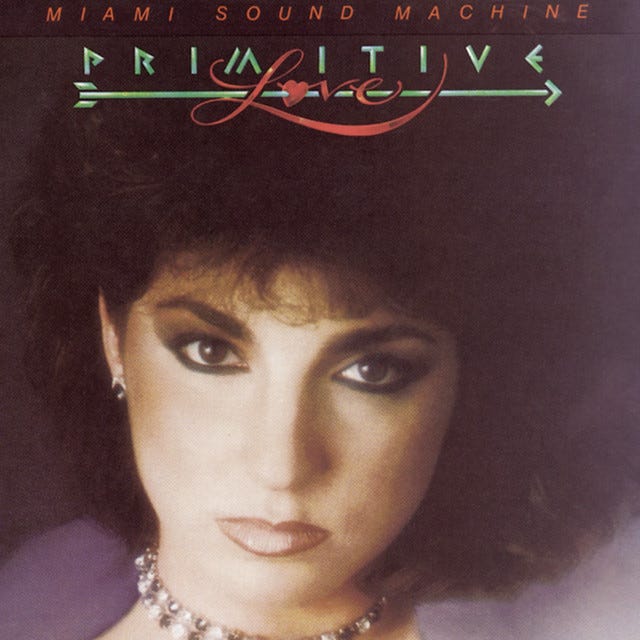EVERY GENRE PROJECT - November 14 - Latin Freestyle
Genre of the Day - Latin Freestyle
Album of the Day - Primitive Love by Miami Sound Machine (1985)
Nostalgia has been one of my driving emotional operators since a young age. I don't know what to attribute it to—an ingrained wistfulness? The fact that tens of thousands of memories are neatly encapsulated in my camera roll, allowing for constant reminiscence? I have found that my nostalgia follows a certain six-month distance pattern, in which half a year ago suddenly seems to be the halcyon days of carefreeness. I’ve been looking back at spring 2024 recently and feeling pangs of nostalgia, including for the amazing EDM class I got to take last semester and mentioned quite extensively on this blog! Today, I got the chance to catch up with the professor who taught the class, whose subscription to this blog I’m quite honored by, and hear about his journey in music scholarship and walk away with a host of writers and music to look into and excited about how much there is to learn and do in the study of music. Today’s genre, a random pick, serves as a coincidental little homage to a chapter of electronic dance history we discussed in class.
Latin freestyle also evokes a different type of nostalgia, one I haven’t lived directly but today’s genre suspends me in. It’s the sound of a hazy, humid summer in New York in the early ‘80s as it climbed out of fiscal crisis, as hip-hop hit the streets and mingled with post-disco electronic music. Freestyle music grew out of electro, one of the first manifestations of an entirely new electronic musical world as the Roland company gently bestowed synthesizers and drum machines upon the world that brought the means of innovative musical production to one’s fingertips with more ease than ever before. Freestyle popularized these rhythms in the context of Latino communities in New York, Miami, and other major US cities, filtering new and futuristic sounds through the lens of a long Latin legacy of dance genres popular stateside like rumba, mambo, and boogaloo.
On top of these bold new frontiers of musical synthesis that went on to dominate popular music in subsequent decades, Latin freestyle was a watershed moment in Latin music’s crossover into American popular music. Reggaetón is now an empire, a brand, and a titanic force in music industry discourse, but Latin freestyle was decades ahead in its blending of rhythmically rich contributions with hip-hop flair. Latin freestyle is formed by synth arpeggios that soar through its sonic winds, TR-808 drum intensity, Latin-indebted percussion like congas, shakers, and timbales and a let-loose degree of electronic flourishes.
There is no name more perfect to represent Latin freestyle than Miami Sound Machine, a knowing wink at the mechanized yet free-form nature of producing Latin music via these new conduits à la producers British Electric Foundation. The melody of “Body to Body” swings and flips around the electronic gymnasium, the drum machine packing a zapped punch. “Mucho Money” excels on delivering the promise of Latin freestyle’s dynamic fusion, packing in dense, mechanistic TR-808 beats with traditional Cuban percussion, horn stabs, and chants. Though slower, more sanguine ballads hold up a bit of the momentum, they still have some of the key twitchiness that made freestyle so exciting. And, of course, this album is host to “Conga,” a song that can wedge itself in my mind’s ears simply by gazing upon the title. Though it’s easy to joke that of course the biggest Latin crossover dance song in the US is also one that requires essentially no movement but walking—untold numbers of Yanks happen to lack rhythm—it is also a winning summation of hundreds of years of Cuban syncretic musical history; the conga line dance was a centuries-old street celebration that began in Santiago, Cuba, expressing unity among enslaved communities. Latin freestyle voiced this passion for music and dance upon the dawn of modern, electronically-driven music, its rhythms still grabbing in their blend of traditional textures with zany, staccato synthwork.




